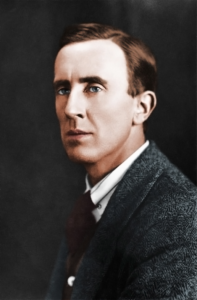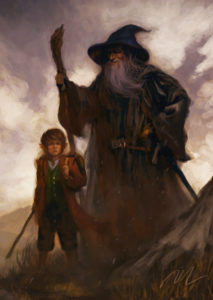Phone Bearers
by Fr. William Rock, FSSP
As Tolkien’s stories also aim to illustrate…one of the greatest ironies of modern industrialization, technology, and its related consumerism is the way in which they have rendered human beings so helplessly dependent upon the very things that were supposed to set them free.1

These powerful and striking words were penned by Jonathan S. McIntosh for his The Flame Imperishable – Tolkien, St. Thomas and the Metaphysics of Faërie. In this work, McIntosh sets out to reveal the influence the philosophy of St. Thomas Aquinas had on Tolkien’s Middle Earth, with a particular focus on the creation account given at the beginning of The Silmarillion, the precursor to The Hobbit and The Lord of the Rings. The words quoted above are found in the chapter on evil: “The Metaphysics of Melkor.”
With very little reflection, the truth of the quote is ascertained. How many skills have been lost due to an over-reliance on technology? How has intellectual rigor decayed with so much information – but not knowledge and wisdom – at the ready? This dependence, however, does not just result in a decay of those who are dependent upon it; it makes them vulnerable as never before. Driving this point home, McIntosh quotes Peter Kreeft’s The Philosophy of Tolkien:
The Industrial Revolution made slavery inefficient and unnecessary. But our addiction is the same whether the slaves are made of flesh, metal, or plastic. We have done exactly what Sauron did in forging the Ring. We have put our power into things in order to increase our power. And the result is, as everyone knows but no one admits, that we are now weak little wimps, Shelob’s slaves, unable to survive a blow to the great spider of our technology network. We tremble before a nationwide electrical blackout or a global computer virus…In our drive for power we have deceived ourselves into thinking that we have become more powerful when all the time we have been becoming less.2
To be honest, Kreeft may have been setting the bar a bit too high. It is true that “we tremble before a nationwide electrical blackout,” but how quickly does work grind to a stop when the internet or electricity is just temporarily down?
Not only has modern man become dependent upon technology, but we have become, in a certain sense, slaves to it, as Kreeft points out. How much of our work, our energy, our money is put into purchasing, updating, or repairing our technology – the washing machine, the air conditioner, the car, the computer, the smart phone?
If anything exemplifies modern man’s slavery to technology, it is the smart phone. He always carries it with him, looking for hotspots to utilize it and outlets to power it with the charger he brings with him. The compulsion to constantly check it for new messages or online updates makes unrelenting demands upon a will that should be free. Phantom buzzing influencing, damaging the mind and body of the bearer.
The choice of the word “bearer” here is not inadvertent, for it calls to mind the Ring Bearers of The Hobbit and The Lord of the Rings, those who carried the One Ring forged by Sauron. This Ring affected the mind and will of the Bearers, influencing and manipulating them with the purpose of being returned to its master and maker. Beyond this influence on the will, the effect of the smart phone on its bearer is similar to other effects the One Ring had on its Bearers. When worn, the One Ring would turn the Bearer invisible, effectively separating him from those around him. Kreeft explains this situation as follows:
Invisibility also means isolation. God alone can endure this (and only because He is a Trinity of persons, a society in Himself). He is God alone; there is no other. Yet He is other in Himself and never alone. God is a community. That is why He needs no community, as we do. The Ring cuts us off from community, and contact. We are alone with the Eye. There is no room for an Other in the One Ring. This is why the Ring surrounds emptiness. If We-ness, or Relationship, or Love, or Trinity is the name of ultimate reality, then the Ring makes us unreal by isolating us. It plunges us into its own emptiness, like a Black Hole. Its circular shape is an image of that the emptiness: it encloses nothingness with its all-encompassing circle of power.3

When one is seen with his head bowed towards the screen, it sends the message that he has cut himself off from those around him. The body language sends a message that he is not open to interacting with others. Such behavior, when prolonged, cannot help but have a negative influence on one’s prayer life, where one is invited to have an intimate and personal friendship with His Creator. If one has the habit of closing himself off to other men, whom he senses, how can he possibly be open to having a relationship with God Whom he cannot (see 1 Joh 4:20)? Interestingly, McIntosh argues that the reason why the One Ring had no power over Tom Bombadil (“a merry fellow; Bright blue his jacket is, and his boots are yellow”4) is because Tom Bombadil is “one of the earthiest characters in Tolkien’s fiction and the one whose whole identity is most tied to his love of and devotion to other things.”5 Tom Bombadil’s devotion to other was explained by Tolkien in one of his letter’s as follows: he desires “knowledge of other things, their history and nature, because they are ‘other’ and wholly independent of the enquiring mind, a spirt coeval with a rational mind, and entirely unconcerned with ‘doing’ anything with the knowledge.”6

But not only does wearing the One Ring make the Bearer invisible to others, it makes him more visible to Sauron, who can be understood as a personification of evil, and his Eye. In a similar way, those who use smart phones, without the proper self-control and, if necessary, protections, are exposing themselves to levels of evil and depravity unthinkable to previous generations. And the more one uses the One Ring, the more one uses the smart phone, the more permanent and damaging the effects are. As Gandalf (an incarnated/embodied angel for all intents and purposes) explained “if one ‘often uses the Ring to make himself invisible, he fades: he becomes in the end invisible permanently, and walks in the twilight under the eye of the dark power that rules the Rings…Yes, sooner or later…the dark power will devour him.’”7 How many long-term smart phone users do not feel the same as Bilbo after he possessed the Ring for as long as he did – “I am beginning to feel it in my heart of hearts….I feel all thin, sort of stretched, if you know what I mean: like butter that has been scraped over too much bread. That can’t be right. I need a change, or something.”?8
There is another way in which the One Ring is similar to a smart phone. In order to forge the One Ring, “the instrument of his domination,”9 Sauron put part of his power, part of his being, part of himself into the artifact. So tied was he to the Ring, that when it was destroyed, his own power and being was dissolved. When one’s smart phone is misplaced, lost, damaged, or destroyed, does not the owner feel like part of himself has been destroyed? That he is incomplete until he finds it or has it replaced? On this point, McIntosh wrote the following: “Tolkien makes the serious, real-world metaphysical point that, in the process of aggrandizing ourselves through materialistic acquisitiveness and scientific mastery of nature, we have in fact emptied ourselves, denied our own nature, and sacrificed something of our own inherent and authentic being.”10
There is not a one-size-fits-all solution to the problems described above, but a reconsideration and reordering of this dependence on technology is necessary so that the negative accompanying consequences can be minimized or avoided altogether. Solutions should be sought by utilizing Christian prudence and principles. But, if any of the Tolkien’s characters should be presented as a model to be followed in such an undertaking, it can be none other than Tom Bombadil with his connection to creation and nature, and, especially, his openness to other persons – an openness which is so necessary and fundamental to the Catholic spiritual life.
William Rock, FSSP was ordained in the fall of 2019 and is currently assigned to Regina Caeli Parish in Houston, TX.
- McIntosh, Jonathan S. The Flame Imperishable – Tolkien, St. Thomas and the Metaphysics of Faërie. Kettering: Angelico Press, 2017, pp. 242-243.
- Kreeft, Peter. The Philosophy of Tolkie, pp. 187-188 as quoted by McIntosh, p. 243.
- Kreeft, p. 181 as quoted by McIntosh, p. 236, footnote 63.
- Tolkien, J. R. R., The Fellowship of the Ring, Chapter 7: “In the House of Tom Bombadil.”
- Tolkien, Letter 196 as quoted by McIntosh, p. 22, footnote 58 [emphases in the original].
- McIntosh, pp. 236-237.
- Ibid., p. 237 quoting Tolkien, The Fellowship of the Ring, Chapter 2: “The Shadow of the Past.”
- Tolkien, The Fellowship of the Ring, Chapter 1: “A Long-Expected Party” as quoted by McIntosh, p. 237, footnote 64.
- McIntosh, p. 244.
- Ibid.
March 25, 2022








